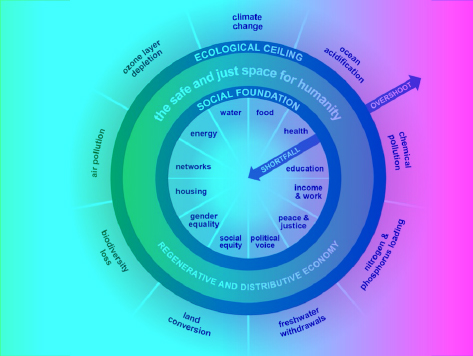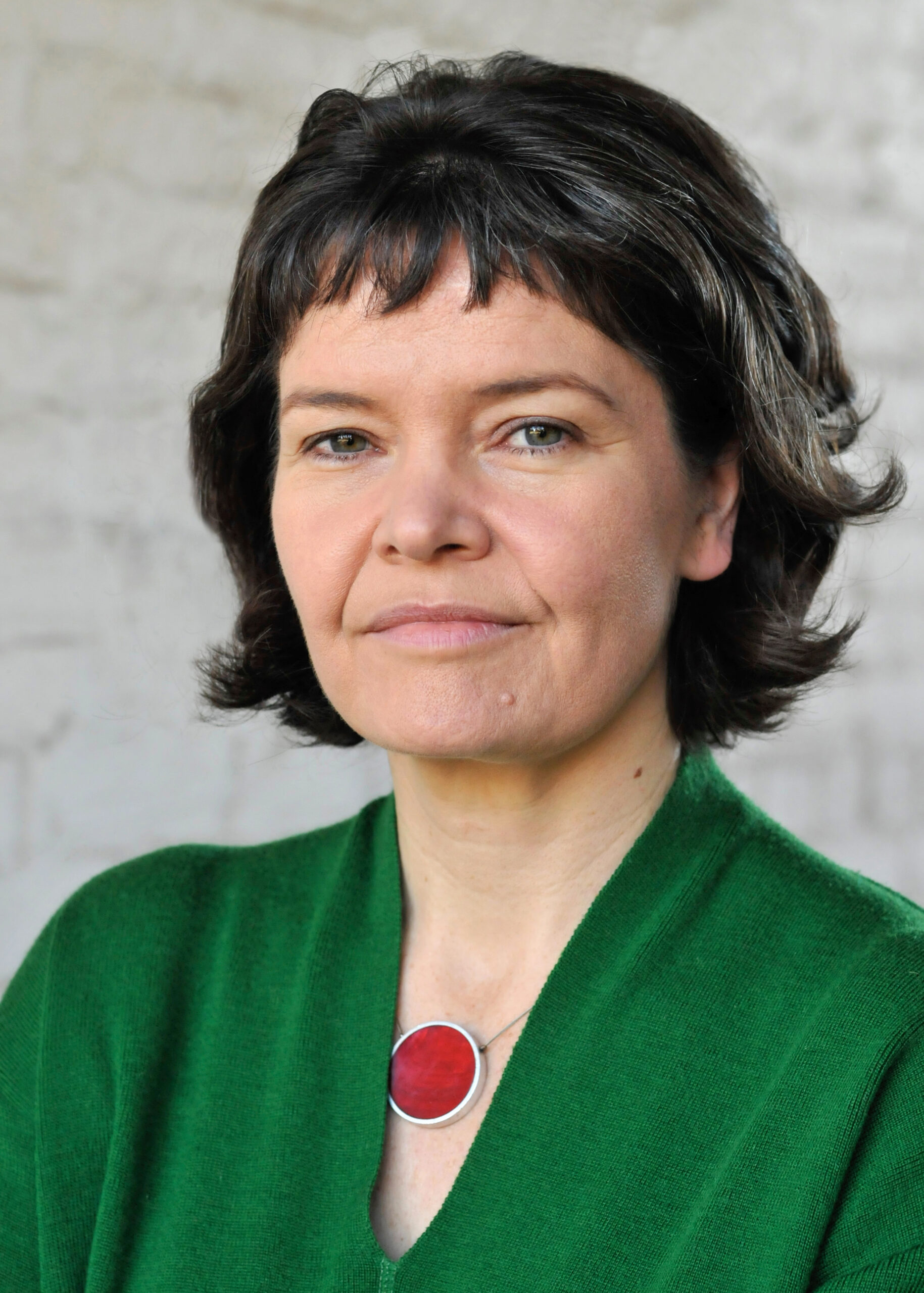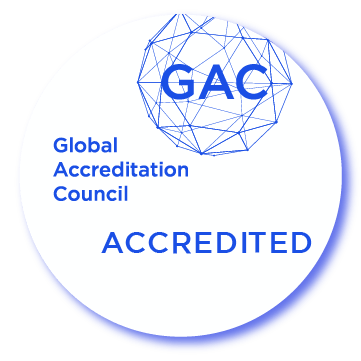
Dates: Fridays Oct 7, 14, 21, 28, 2022
Location: On Zoom – 3-5pm UK time, 7-9 AM Pacific Time, 4-6 PM CET
Zoom Information: Once you have registered for this program, please ensure you are signed in to your account and return to this page to access the “Get Your Zoom Link” lesson at the very bottom of the page. You must register separately on Zoom to get your participation codes and reminder emails.
Faculty: Kate Raworth, Ph.D
Academic Credit: Masters – 1 credits; Doctoral – 1 credits
Enrollment: This course is available both to enrolled students and lifelong learners
Building on the Foundations of Doughnut Economics lecture series in June 2021, we bring you Doughnut Economics 2.0 – a course that will take you to the leading edge of transformative action around the world, introducing you to innovative Doughnut Economics practitioners in cities, communities and enterprise design.
Kate Raworth and Carlota Sanz will introduce us to the key concepts of Doughnut Economics and strategic thinking behind putting these ideas into practice, and members of the Doughnut Economics Action Lab (DEAL) team will introduce us to practitioners from across the DEAL Community to share their stories and insights of practical action.
This course is an integral part of our MRA (Master in Regenerative Action) and follows the required initial introductory course. If you are interested in enrolling in the degree please submit your information here:Get Started.
By the end of the course you should be able to:
-
Explain the main concepts behind Doughnut Economics and why they are relevant for the challenges of the 21st century.
-
Understand some practical applications of the concepts in the realms of public policy making, grassroots community organising and in the design of business and enterprise.
-
Point to examples of people putting Doughnut Economics into practice in various contexts around the world, including both the benefits and challenges putting these ideas into practice.Consider and start designing your own interventions around the ideas of Doughnut Economics, whether in your home life, your community, your work or other.
Faculty:
 Kate Raworth (sounds like ‘Ray-worth’) is a renegade economist focused on exploring the economic mindset needed to address the 21st century’s social and ecological challenges, and is the creator of the Doughnut of social and planetary boundaries. She is a Senior Research Associate at Oxford University’s Environmental Change Institute, where she teaches on the Masters in Environmental Change and Management. She is also Professor of Practice at Amsterdam University of Applied Sciences. Her internationally acclaimed framework of Doughnut Economics has been widely influential amongst sustainable development thinkers, progressive businesses, and political activists, and she has presented it to audiences ranging from the UN General Assembly to the Occupy movement. Her book, Doughnut Economics: Seven Ways to Think Like a 21st-Century Economist was published in 2017 and has been translated into 18 languages.
Kate Raworth (sounds like ‘Ray-worth’) is a renegade economist focused on exploring the economic mindset needed to address the 21st century’s social and ecological challenges, and is the creator of the Doughnut of social and planetary boundaries. She is a Senior Research Associate at Oxford University’s Environmental Change Institute, where she teaches on the Masters in Environmental Change and Management. She is also Professor of Practice at Amsterdam University of Applied Sciences. Her internationally acclaimed framework of Doughnut Economics has been widely influential amongst sustainable development thinkers, progressive businesses, and political activists, and she has presented it to audiences ranging from the UN General Assembly to the Occupy movement. Her book, Doughnut Economics: Seven Ways to Think Like a 21st-Century Economist was published in 2017 and has been translated into 18 languages.
Course Overview
Week 1 • Intro to DEAL: Concepts and Strategy
Friday 7th October, 3-5pm UK time, 7-9 AM Pacific Time, 4-6 PM CET
Kate Raworth (DEAL’s Co-founder & Conceptual Lead) and Carlota Sanz Ruiz (DEAL’s Co-founder & Strategy Lead)
In this opening session, Kate and Carlota will introduce the Doughnut of social and planetary boundaries along with an overview of the seven ways to think like a 21st century economist – focusing on the power of visual imagery in shaping worldviews. We will also explore emerging strategies for putting these ideas into practice, as Doughnut Economics Action Lab working in collaboration with a worldwide community of changemakers.
Week 2 • Engaging with Cities & Places
Friday 14th October, 3-5pm UK time, 7-9 AM Pacific Time, 4-6 PM CET
Leonora Grcheva (DEAL’s Cities & Region’s Lead) and Andrew Fanning (DEAL’s Research & Academia Lead)
Co-presenters from the DEAL Community
- Ben Geselbracht, Nanaimo
- Ona and Morena, Barcelona
- Madelaien, Tomelilla
In this session, Leonora Grcheva and Andrew Fanning will introduce how places are engaging with the concepts and tools of Doughnut Economics to help frame the 21st century challenges they face, both socially and ecologically. They will outline DEAL’s approach to ‘unrolling’ the Doughnut for places, discussing conceptual, empirical, and institutional challenges that this raises, and sharing examples of the diverse ways it is being put into practice by local and regional governments worldwide. We will also hear from changemakers who are putting these tools into practice in their own cities and places, learn from their experiences and challenges, and be inspired by their pioneering initiatives
Week 3 • Engaging with Communities
Friday 21st October, 3-5pm (UK time), 7-9 AM Pacific Time, 4-6 PM CET
Rob Shorter (DEAL’s Communities & Art Lead)
Co-presenters from the DEAL Community
- Immandeep Kaur, Birmingham
- Mona Ebdrup, Aarhus and Copenhagen
- Ana Lavaquial, Rio de Janeiro
In this session, Rob will share how communities are coming together to engage with the ideas of Doughnut Economics at the household, street and neighbourhood scale. Rob will also share how changemakers are connecting at the city, regional and national scale to create communities of practice around the ideas of Doughnut Economics as a powerful convening idea for transformative action in their place. We will hear from Immandeep Kaur, Mona Ebdrup and Ana Lavaquail – changemakers working within these two different community contexts – and we will be introduced to the tools and resources you can use to immediately start introducing and exploring the ideas in your own communities.
Week 4 • Engaging with Business
Friday 28th October, 3-5pm (UK time), 7-9 AM Pacific Time, 4-6 PM CET
Erinch Sahan (DEAL’s Business & Enterprise Lead)
In this final session, Erinch Sahan will explore how Doughnut Economics can be applied to businesses. Erinch will introduce the diverse range of responses of business to the 21st-century challenge of meeting the needs of all within the means of the living planet, providing examples of companies that are working to put regenerative and distributive practice at the heart of their operations. Critically, he will explore how the deep design traits of businesses can help or hinder efforts to pursue regenerative and distributive practices. The design layers of businesses will be explored in some detail – its purpose, networks, governance, ownership, and finance. We will then discuss the way the deep design of business can be transformed, including the changes needed at the industry and broader systems that shape business designs and practices.
Requirements for enrolled Degree students to earn 1 Credit:
- End of course essay on describing the impact on your life of studying this material
- For BA students – 6-9 pages in length
- For MA students – 10-15 pages in length
- For PhD students – 20-25 pages in length
Pricing:
- BA Level: $100
- MA Level: $200
- PhD Level: $300
- Audit-No Credit: $60
Our shopping cart is simple and easy to understand. If you do not have a user account, you will be able to create one upon purchase. Save your username and password as you will need it to login to access course materials later. For more detailed, step-by-step instructions you can review our tutorial How to Purchase a Course. Again, if you experience any issues, please email Veronica Saldias at registrar@ubiquityuniversity.org.
Live Webinar Contact Information:
If you have questions or require additional assistance, you may click the “Chat” button on the lower, left-hand side of the screen, and submit your question. Our help desk will respond as soon as possible. Please do not email faculty directly with any technology or registration issues.
Information about how we process refund or cancellation requests can be found here: Refund and Cancellation Policy.


